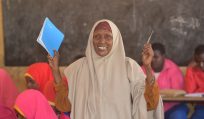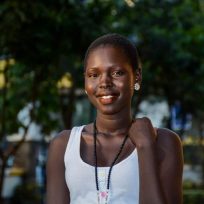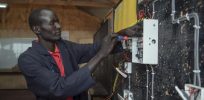Hungry for help: refugees in Kenya feel the effects of recent food cuts
KAKUMA REFUGEE CAMP, Kenya, January 9 (UNHCR) – Nyachot squints up at the midday sun above Kakuma Camp as she stirs the daily meal for her family. Before last November, the 34-year-old South Sudanese refugee could cook twice a day. But when the World Food Programme cut rations by 50 per cent that month, she feared for her children’s future.
“The food does not even last the two weeks that it should,” Nyachot told UNHCR visitors, turning to gaze at her baby son. Like thousands of other women at this camp in north-west Kenya, she relies completely on the rations she receives, in the absence of any other source of income. Full rations were later resumed on January 1, but the situation remains serious and fresh funding is needed to avert the risk of further cuts in the future.
Nyachot fled South Sudan in February last year, after fighting intensified between government forces and rebels. Desperate to save her children, she embarked upon an arduous weeklong journey that took her from her home in Maiwat, Upper Nile state to Nadapal, the border entry point to Kenya.
Her eyes filled with tears as she recalled the trauma. “I travelled by boat with about 40 other people for five long days to Juba and then took a bus from there to Nadapal,” she said. “My children were hungry and thirsty.”
When they finally arrived in Nadapal, UNHCR officials and other humanitarian agencies were there to greet them with energy biscuits and water. Later, at Kakuma’s reception centre, they received hot meals, sleeping bags and a place to sleep, before being transferred to Kakuma 4, the new settlement area for South Sudanese arrivals.
For Nyachot, finding refuge in Kakuma and receiving food assistance was a huge relief. Non-food items, such as blankets, cooking utensils, an energy stove and jerry cans, were also supplied and helped her family settle into their new home. But with the food ration cuts in November, Nyachot’s concern quickly began to grow.
In one of the nearby mud houses, Stephen and Gawar shared similar worries. They fled Pangak in South Sudan’s Jonglei state and, like Nyachot, sought refuge in Kakuma. “The situation is very bad,” observed Stephen, interviewed before full rations were resumed last week. “We eat once a day and the food can get finished after five days. Some of our people are even thinking of going back home. It is not an ideal solution, but people are desperate.”
Nyagai, their 36-year-old neighbour, concurred. “Once the rations run out, I survive by begging for food from my neighbours,” she says. “It is a shame to do so but what option do I have?”
Her friend, Nyapel, smiled sadly when she revealed that she could not breastfeed her 11-month-old son due to a medical condition. “I have to sell part of my meagre rations so as to buy milk for him. If I don’t this, then my son will not survive.”
After the ration cuts took effect in November, concerted efforts were made by World Food Programme to raise additional funding and restore full rations – and this was possible at the start of the month. But the funding situation remains uncertain and WFP and UNHCR have issued joint appeals to donors for help.
Meanwhile, UNHCR and partner NGOs continued to engage with refugees through their community leaders to assure them of continued support during November and December. These efforts were a result of the recent joint Inter-Agency Regional Appeal for the South Sudan Emergency Response.
Although refugees had been assured that this was a temporary situation, they remain concerned. “If the food cuts continue, many people will suffer, especially the elderly, the women and children,” said Gawar. Stephen believed that their hope lies with UNHCR.
As she turned back to her cooking, a glimmer of hope flickered in Nyachot’s eyes. She, at least, believed that things would get better; if not for her then at least for her children.
Page 7 of 18
-

Football: A unifying diversity in Kakuma Refugee Camp
5 Apr 2019It is this love of football and the team’s excellent sportsmanship that has seen the first refugee team ever, play in the Kenyan National Football League
-

Championing the education of girls and boys in the world’s third largest refugee camp
2 Apr 2019I won’t stop until every young refugee boy and girl is educated
-

Kenyan woman who welcomed a refugee into her home
7 Mar 2019“I did not know much about refugees until I met Jean Petil”
-

Visiting Turkish doctors give specialized health care to refugees and host communities in Kakuma
22 Feb 2019More than 6000 people received free medical services during the Kakuma health week.
-

#10YearChallenge of a South Sudanese refugee in Kenya
8 Feb 2019#10YearChallenge has gone viral as people make comparisons of themselves now and 10 years ago. Elizabeth, a South Sudanese refugee living in Dadaab refugee camp, in north-eastern Kenya, recalls living a simple life as the last born in her family of 5, before the war forced them out of their country. She narrates her story to UNHCR’s Mohamed Aden Maalim.
-

UNHCR upgrades its data management system to improve efficiency
5 Feb 2019Population Registration and Identity Management EcoSystem (PRIMES) has been rolled out in the Government registration centres in Nairobi, Nakuru, Eldoret, Mombasa and Dadaab camp
-

Advance vocational training empowers refugees and Kenyans in Kalobeyei Settlement
29 Jan 2019Vocational skills training equips refugees and Kenyans with market-oriented skills that empower them to make choices.
-

Top Refugee Students Receive Equity Bank Secondary Education Scholarship
22 Jan 2019“Our teacher told us, the fact that we are refugees does not mean that our dreams are dead.”
-

M-Pesa Academy admits 5 refugee students for fully funded secondary education
15 Jan 2019For the second year in a row, five more refugees have been admitted to the prestigious M-Pesa Foundation Academy
-
East, Horn, and Great Lakes region refugee livelihoods workshop takes place in Nairobi
24 Dec 2018“When refugees are included in the economic sphere as consumers, producers and business owners/employers and employees, opportunities are created for the whole locality hosting refugees,” Ziad Ayoubi, UNHCR’s Head of Livelihoods and Economic Inclusion
